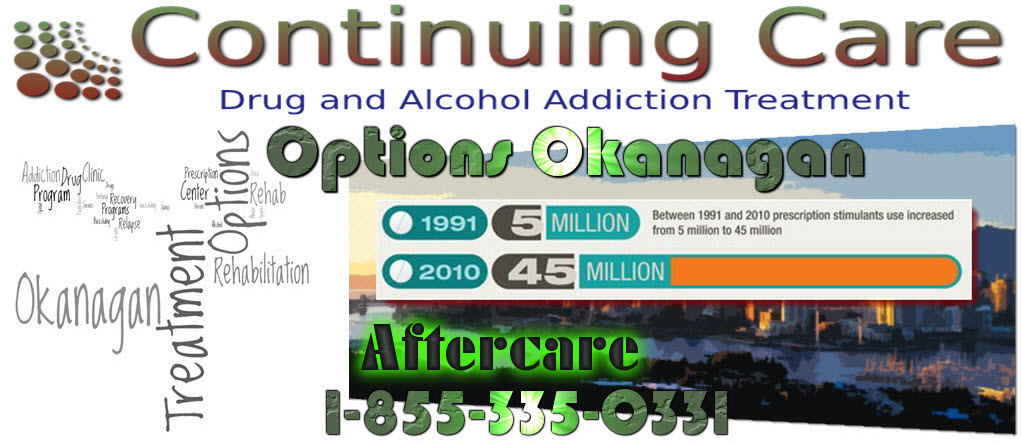Aftercare and continuing care in Vancouver, BC and how relapses can be avoided in Vancouver, Victoria and Kelowna, British Columbia. – Options Okanagan Treatment Centers in Kelowna, British Columbia treating opiate and alcohol addiction and recovery.
In a number of different ways, the hardest part of establishing and maintaining a long-term recovery process takes place after the initial, intensive part of the treatment process is complete.
To avoid relapse from occurring, most people need the warm support of their loved ones – whether that is biological family members they are close to or new chosen “family” comprised of other recovering people they believe they can turn to whenever they think they are in danger of having a relapse.
One study identified five factors that contribute most frequently to relapse occurring:
a) Low motivation for making changes
b) Negative thinking
c) Failure to follow through with the recommendations made by doctors and counselors
d) Interpersonal conflicts with members of the family and other individuals
e) Being unable to to manage stress levels or negative emotions
These are similar factors that affect relapse when needing to deal with diabetes as well as other types of chronic disorders:
a) Failure to stick with diet, medications or behavior changes
b) Poverty
c) Inadequate family member support
d) Co-occurring mental health disorders
Among the many things that addicted individuals need to learn is how to avoid being exposed to triggers that may set their brains into motion to want and need drugs or alcohol. There are times when it is unavoidable to come into contact with triggers, so people need to develop the right skills to help them prevent their cravings from taking over completely. One core element of a good treatment program needs to be learning those skills; being able to maintain them needs to be part of an aftercare program or long-term recovery plan.
According to a well known and reputable aftercare counselor, who assists fellow AA and NA members, aftercare is a kind of continuing care that people need to stay involved in to survive. He says that if an individual just leaves their 30 day, or 60 day treatment program and does not participate in a group or attend meetings or have any commitment or a sponsor, that very quickly the person will go back. They will be unable to resist the temptations of Drugs or Alcohol.
A leading counselor, who is in charge of a confidential addiction assistance program at a major Canadian College of Medicine for helping employees, says that experts can’t emphasize the role aftercare contacts plays strongly enough in addition to the aftercare program. He states it is the key to succeeding.
Another counselor, who leads a recovery center in Vancouver, where participants can gather for friendships, mutual aid, job training and other kinds of tangible assistance for helping people in recovery get on their feet again, and remain committed to their recovery and starting a new life, says that a critical component of the recovery center is peer support. However, the focus of this organization are solution-oriented efforts and it doesn’t limit itself to only specific issues that emerge from 12-step program addiction-focused dialogue. Instead of the focus being on the problem, aftercare looks for a solution instead.
Many people think they are attempting to replace AA. However, their intention isn’t to replace 12-step. People who are involved in a long-term recovery process are in a very different stage and have very different needs as well. Recovery commitment plans have been developed by the counselors for their clients. These plans have the goal of getting clients to the place where they can prepare themselves to lead a lifetime of recovery.
Services such as recovery centers, mentoring, peer counseling, educational services and skill training all play key roles in helping addicted individuals rebuild their lives, avoid relapse and sustain recovery that is long-term in nature . A small federal program called the Recovery Community Services Program (RSCP), funds community-based and faith-based programs that provide these services, and connects people with housing, jobs and/or educations, in addition to alcohol-free or drug-free social activities.
Options Okanagan Opiate and Alcohol Treatment Centers in Kelowna, Salmon Arm and Vancouver, British Columbia – Men and Women are recovering and healing from Alcohol and Drug Abuse at our treatment center here in the Okanagan right now.
Our unique and distinctive Opiate Drug and Alcohol treatment program allows men and women to come in from Calgary as well as Edmonton as we offer airport pickup.
Numerous clients come to us from Vancouver, Calgary and Edmonton and other locations in Alberta and even other provinces for Opiate addiction treatment, heroin drug treatment, many other drug and alcohol addictions for rehabilitation because of the uniqueness of our treatment center.
Our Treatment Location:
Options Okanagan Drug and Opiate Treatment Center
551 Sherrydale Crescent, Kelowna, British Columbia, V1V 2E6
Toll Free Phone Number : 1-855-335-0331




